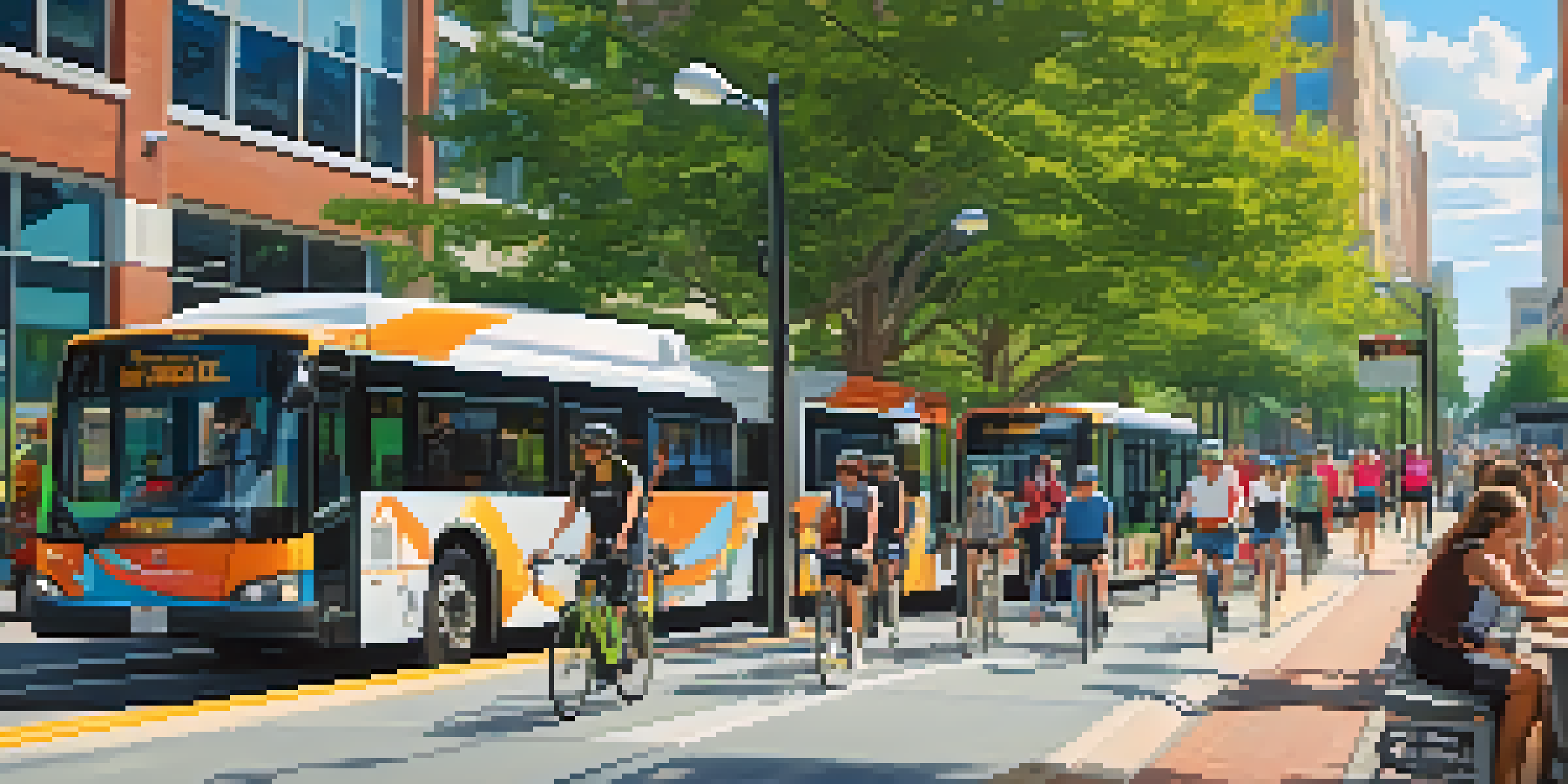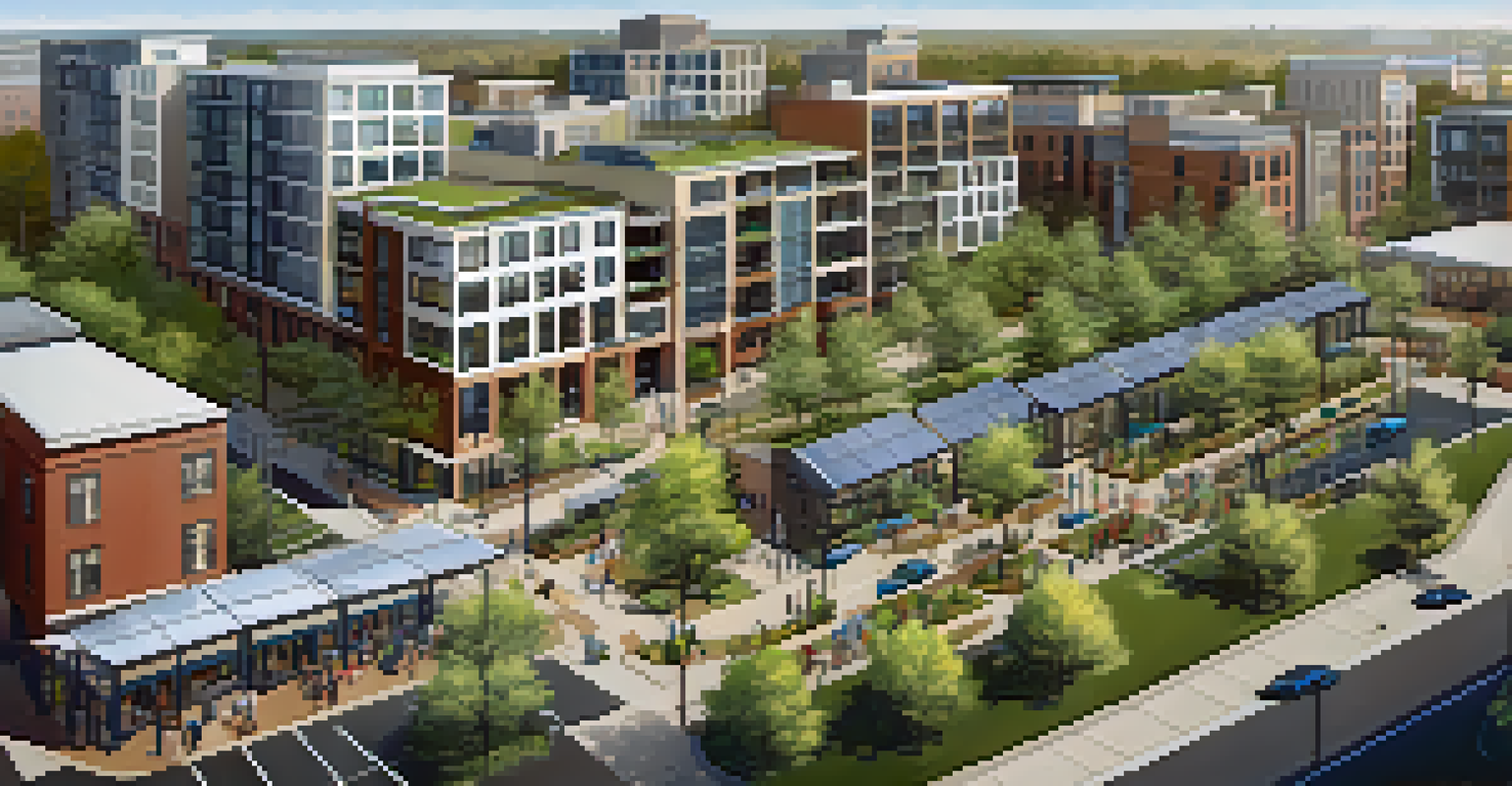Sustainable Transportation: Charlotte's Innovative Transit Solutions

Understanding Sustainable Transportation in Charlotte
Sustainable transportation refers to mobility solutions that minimize environmental impact. In Charlotte, this concept is taking root as the city embraces innovative transit options. The goal is to reduce congestion, lower carbon emissions, and create a more livable urban environment for residents.
A sustainable transportation system is about creating a balance between the needs of the environment, the economy, and the people who live in our communities.
This approach includes various strategies, such as enhancing public transit networks, promoting cycling, and improving pedestrian pathways. By rethinking how we move around the city, Charlotte aims to foster a healthier lifestyle while contributing to climate change mitigation. It's all about making mobility smarter and more efficient.
As Charlotte grows, the challenge becomes finding ways to accommodate an increasing number of residents without sacrificing quality of life. Sustainable transportation is central to this effort, ensuring that future development is both environmentally responsible and community-friendly.
Innovative Public Transit Options in Charlotte
Charlotte's public transit system, known as CATS (Charlotte Area Transit System), is at the forefront of the city's sustainable transportation initiatives. CATS has introduced electric buses to its fleet, which not only reduce emissions but also lower operational costs over time. These zero-emission vehicles are a game-changer for urban mobility.

Moreover, the city is expanding its light rail services, connecting more neighborhoods and making public transport a more viable option for residents. By increasing accessibility and convenience, Charlotte aims to encourage more people to leave their cars at home and opt for public transit instead.
Charlotte Embraces Sustainable Transit
The city is investing in innovative public transit options to reduce congestion and carbon emissions.
This innovative approach is also reflected in the development of transit-oriented communities, where residential and commercial spaces are built in proximity to transit hubs. This not only promotes the use of public transport but also enhances local economies.
Biking Initiatives: A Breath of Fresh Air
Biking is becoming an increasingly popular mode of transportation in Charlotte, thanks to the city's commitment to expanding its bike infrastructure. The introduction of dedicated bike lanes and bike-sharing programs has made cycling safer and more accessible for everyone. This is a crucial step towards reducing reliance on personal vehicles.
The future of transportation is not just about getting from point A to point B; it’s about creating a community that is healthy, accessible, and sustainable for all.
In addition to physical infrastructure, Charlotte promotes biking through community events and educational programs. Initiatives like 'Bike Month' encourage residents to explore their city on two wheels while fostering a sense of community among cyclists. It's a win-win for health and the environment.
The city's efforts to promote cycling not only help reduce traffic congestion but also contribute to a healthier population. As more people choose to bike, they experience the benefits of physical activity while enjoying Charlotte's beautiful scenery.
Pedestrian-Friendly Developments Across the City
Creating a pedestrian-friendly environment is essential for sustainable transportation, and Charlotte is making strides in this area. With the development of wider sidewalks, pedestrian plazas, and improved crosswalks, walking in the city is becoming safer and more enjoyable. This encourages residents to choose walking over driving for short trips.
Additionally, the city has invested in green spaces and public parks, which not only beautify neighborhoods but also provide places for people to gather and walk. These developments promote a sense of community and encourage outdoor activities, further enhancing the urban experience.
Biking Initiatives Boost Community Health
Dedicated bike lanes and community events are promoting cycling as a safe and enjoyable transportation choice.
By prioritizing pedestrians, Charlotte aims to create an urban landscape that supports healthier lifestyles while reducing traffic congestion. The more inviting the city is for walkers, the less dependency there is on cars.
Collaborations for Sustainable Transit Solutions
Partnerships between local government, businesses, and community organizations are crucial for developing sustainable transit solutions in Charlotte. These collaborations help pool resources and expertise to create more comprehensive transportation strategies. For instance, local businesses can provide support for bike-sharing programs or sponsor public transit initiatives.
Moreover, engaging the community in discussions about transportation needs ensures that solutions are tailored to the people who use them. Town halls and public forums are excellent opportunities for residents to voice their opinions and contribute to the planning process.
Through these collaborative efforts, Charlotte can foster a sense of ownership among its residents regarding sustainable transportation initiatives. When people feel invested in the solutions, they are more likely to embrace and utilize them.
The Role of Technology in Transportation Innovation
Technology plays a pivotal role in advancing sustainable transportation in Charlotte. From real-time transit tracking apps to smart traffic management systems, technology enhances the efficiency and usability of transit options. These innovations help reduce wait times and congestion, making public transit a more appealing choice.
Additionally, data collected from transportation networks can inform future planning and improvements. By analyzing usage patterns, the city can make informed decisions about where to expand services or improve infrastructure, ensuring that resources are allocated effectively.
Collaboration Drives Transit Solutions
Partnerships among local government, businesses, and residents are essential for developing effective sustainable transportation strategies.
As Charlotte embraces these technological advancements, the city is not only improving the current transportation landscape but also preparing for future challenges. It’s about creating a smart, connected city that prioritizes sustainability.
Looking Ahead: The Future of Transit in Charlotte
The future of transportation in Charlotte looks promising as the city continues to invest in sustainable solutions. With ongoing projects aimed at expanding public transit, improving biking infrastructure, and enhancing pedestrian pathways, the city is on a path to becoming a leader in sustainable mobility. These efforts are crucial as urban populations grow.
Moreover, as awareness of climate change increases, residents are becoming more supportive of initiatives that promote sustainability. This shift in mindset is encouraging city planners to push for even more ambitious projects that prioritize eco-friendly transportation options.

Ultimately, Charlotte's commitment to sustainable transportation is about ensuring a better quality of life for its residents. By investing in innovative transit solutions today, the city is paving the way for a more sustainable and equitable tomorrow.